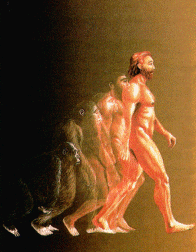In the beginning...
|
Do huge
advances
in human knowledge of the universe spell the end for the idea of an
all-powerful creator,or has the hand of God simply become more
evident?
John Windell
In his Summa Theologica, the medieval
philosopher
St Thomas
Aquinas set out 'the Five Ways' that prove the
existence of God. The fifth one observed that
the world displays order and design, and since things cannot order or design
themselves, they must have been made this way by an intelligent and powerful
designer. In other words, God.
This 'argument from
design' articulated one of the cornerstones of the
Christian faith: that God created the universe
and everything in it. This was not an exclusive idea, but one taught by many
religions, including Judaism and Islam. So when people looked up at the heavens
- at heaven itself - they marvelled at the might and magnificence of God,
the endless beauty and depth of His creation.
We still gaze at the stars with a sense of wonder, but the awe we feel today
is more likely to be informed by the simple truth of the sight we behold:
that we occupy a small planet orbiting a minor star, one of 100 billion stars
in our galaxy, the Milky Way, itself only one of 100 billion galaxies in
the unimaginable expanse of the universe.
This is the wonder of what modern science has given us - the same wonder
we feel when presented with the idea of the Big Bang,
the birth of time and an ever-expanding universe
- and it has changed the way we look at ourselves and the world we live in,
seeming to thrust aside the notion that everything was created by an all-powerful
being.
Charles Darwin cast perhaps the biggest
stone into the pond with the theory of evolution, which showed that far from
conforming to a grand and instant design, all living organisms took millions
of years to reach their present state. This shattered the literal interpretation
of the book of Genesis that God created the universe in six days. So the
interpretation became metaphorical instead, and God's hand is now seen in
the Big Bang, the point at which science tells us the universe actually began.
But even this notion is now under assault from science.
Professor Stephen Hawking,
among the most famous scientists working today, argues that science will
soon understand enough to explain the background to the
Big Bang: using quantum
theory and the concept of imaginary time,
if might be possible to describe the conditions in which the Big Bang occurred,
and what caused if. In this case, said Hawking in a recent lecture, "one
wouldn't have to appeal to something outside the universe to determine how
the universe began. The universe would be a completely self-containing system."
Might this suggest there would be no room for a creator?
Dr Robert Russell, the head of the Centre for Theology and Natural Sciences,
an off-shoot of the University of Berkeley in California, disagrees. As its
name suggests, the aim of Russell's organisation is to bring religion and
the natural sciences together so they might learn from one another, and he
argues that Hawking's theories support the idea of God as a being who transcends
time and space.
Others in the pro-God camp use as evidence the search for a unified field
theory, which attempts to put the sum total of nature's forces into a single
and cohesive framework - in other words, a
theory of everything. They say this search, started
by Einstein, who believed
in a simple and elegant explanation for the universe, is in essence a religious
quest, that it is driven by a conviction in the existence of an exclusive
force of creation.
The same people also reject those objections to cosmology that argue it renders
humans insignificant. On the contrary, they say, given what we know about
the universe, particularly the extraordinarily rare conditions required to
support life here on Earth, humans are very much at the centre of creation.
We are special indeed.
However, none of this is likely to impress Professor
Richard Dawkins, who has written several best-selling
science books and prefers to believe in science rather than God. "God in
this sophisticated, physicist's sense bears no resemblance to the God of
the Bible or any other religion," he has said. "If a physicist says God is
another name for Planck's
constant, or God is a superstring, we should
take it as a picturesque metaphorical way of saying that the nature of
superstrings or the value of Planck's constant is a profound mystery. It
has obviously not the smallest connection with a being capable of forgiving
sins ... who cares about whether the Sabbath begins at 5pm or 6pm."
While this dissects the more debatable meanings attached to 'God' here on
Earth, it isn't an entirely convincing or even logical argument against the
existence of a creator. For that we must wait for science to discover more
of the universe's secrets. But just as science has changed our notions of
who we are, theological discourse has shown it can keep up.
Of course, it would be some achievement for either science or theology to
confirm, once and for all, whether God exists (but then He might have to
something say about that). Then again, there is the matter of simple faith,
which won't yield so easily to scientific explanation or theological argument.
| MP3 87K |
| | Center for Theology and Natural Science | Arts@The OU | Stephen Hawking | Richard Dawkins | Unnatural Selection | Simon Conway-Morris | Nancy Rothwell | The Self Organizing Universe | |
